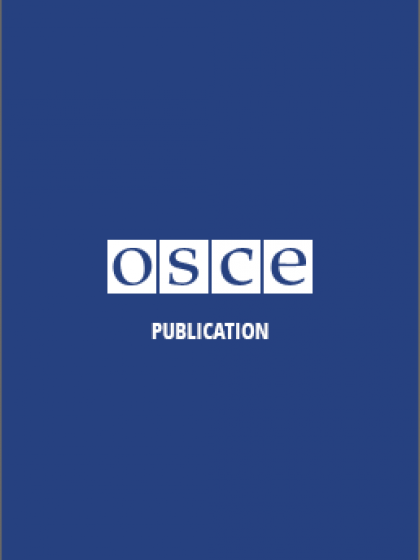Publications
Common Responsibility: Commitments and Implementation
Publishing date: 10 November 2006
Collections: ODIHR Publications
Content type: Study / report
Where we are: OSCE Office for Democratic Institutions and Human Rights
Publisher: Organization for Security and Co-operation in Europe
Report submitted to the OSCE Ministerial Council in response to MC Decision No. 17/05 on Strengthening the Effectiveness of the OSCE.
2020-21 Report of the OSCE Special Representative and Co-ordinator for Combating Trafficking in Human Beings: Advancing new strategies to end exploitation
Publishing date: 31 May 2022
Collections: Annual Reports of the OSCE Office of the Special Representative and Co-ordinator for Combating THB
Content type: Annual report
Where we are: Office of the Special Representative and Co-ordinator for Combating Trafficking in Human Beings
What we do: Combating trafficking in human beings
Publisher: Organization for Security and Co-operation in Europe
This Biennial Report reflects the work of the Office of the OSCE Special Representative and Co-ordinator for Combating Trafficking in Human Beings in 2020 and 2021. It is designed to highlight the Office's comprehensive strategy to end trafficking, the priorities informing the Office's programmatic work, the efforts made with participating States to help them develop more effective laws and policies, and the impact the Office aims to achieve on the ground.
Roma Housing Settlements in South-Eastern Europe: Summary and Recommendations
Publishing date: 15 December 2006
Content type: Study / report
Where we are: OSCE Office for Democratic Institutions and Human Rights
What we do: Roma and Sinti
Publisher: Organization for Security and Co-operation in Europe
Summary and recommendations of a Serbian language publication that looks at Roma housing issues in Serbia.
Background Study: Professional and Ethical Standards for Parliamentarians
Publishing date: 25 January 2013
Content type: Study / report
Where we are: OSCE Office for Democratic Institutions and Human Rights
What we do: Democratization, Good governance
Publisher: Organization for Security and Co-operation in Europe
This study provides an overview of the practical measures OSCE participating States can take to promote ethical behaviour among politicians.
News in brief
Publishing date: 8 May 2006
Content type: Periodical / journal / magazine
Where we are: OSCE Office in Zagreb (closed)
What we do: Democratization, Human rights, Elections, Media freedom and development, Rule of law
Publisher: Organization for Security and Co-operation in Europe
Parliament adopts law on permanent state election commission; Parliament adopts three-year plan for combating corruption; Repeat local elections conducted calmly and in line with regulations; Journalist suing Croatia for violation of human rights.
Security Sector Governance and Reform: Guidelines for OSCE Staff
Publishing date: 17 February 2022
Content type: Guide / manual / handbook
Where we are: OSCE Secretariat
What we do: Reform and co-operation in the security sector
Publisher: Organization for Security and Co-operation in Europe
This updated edition of the Guidelines provides tools for OSCE executive structures and their staff to pursue a coherent and co-ordinated approach to supporting nationally-led Security Sector Governance and Reform processes.
Hate Crime Victim Support: Policy Brief
Publishing date: 22 April 2022
Content type: Guide / manual / handbook
Where we are: OSCE Office for Democratic Institutions and Human Rights
What we do: Tolerance and non-discrimination
Publisher: Organization for Security and Co-operation in Europe
Hate Crime Victim Support: Policy Brief Hate Crime Victim Support: Policy Brief This policy brief condenses the knowledge and key findings of the Enhancing Stakeholder Awareness and Resources for Hate Crime Victim Support (EStAR) project implemented by the OSCE Office for Democratic Institutions
Guidelines on Human Rights Education for Secondary School Systems
Publishing date: 24 September 2012
Collections: ODIHR Publications
Content type: Guide / manual / handbook
Where we are: OSCE Office for Democratic Institutions and Human Rights
What we do: Human rights, Education, Youth
Publisher: Organization for Security and Co-operation in Europe
These guidelines, which focus on human rights education in secondary schools, aim to support systemic and effective human rights learning for all young people.
Quality Specialist Support Services for Hate Crime Victims: Training Course
Publishing date: 5 April 2022
Content type: Guide / manual / handbook
Where we are: OSCE Office for Democratic Institutions and Human Rights
Publisher: Organization for Security and Co-operation in Europe
Hate crime is a manifestation of discrimination and intolerance that has a profound impact on victims, communities and societies. Victims of hate crimes require specialist services to support them in their recovery from these crimes, to enable them to effectively participate in the criminal justice process and to regain a sense of agency. This support includes practical help, emotional and psychosocial support, and advice relating to legal and financial issues, as well as community work. Such specialist support is tailored specifically to each individual who is a victim of or a witness to a hate crime, has experienced a hate incident or is affected by a hate crime committed against someone else.
Guidelines on Human Rights Education for Law Enforcement Officials
Publishing date: 24 September 2012
Collections: ODIHR Publications
Content type: Guide / manual / handbook
Where we are: OSCE Office for Democratic Institutions and Human Rights
What we do: Human rights, Education
Publisher: Organization for Security and Co-operation in Europe
The document presents approaches to be adopted when planning or implementing human rights education for law enforcement personnel related to six key structural areas: the human rights-based approach to human rights education; core competencies; curricula; training and learning processes; evaluation; and professional development and support of educational personnel.










